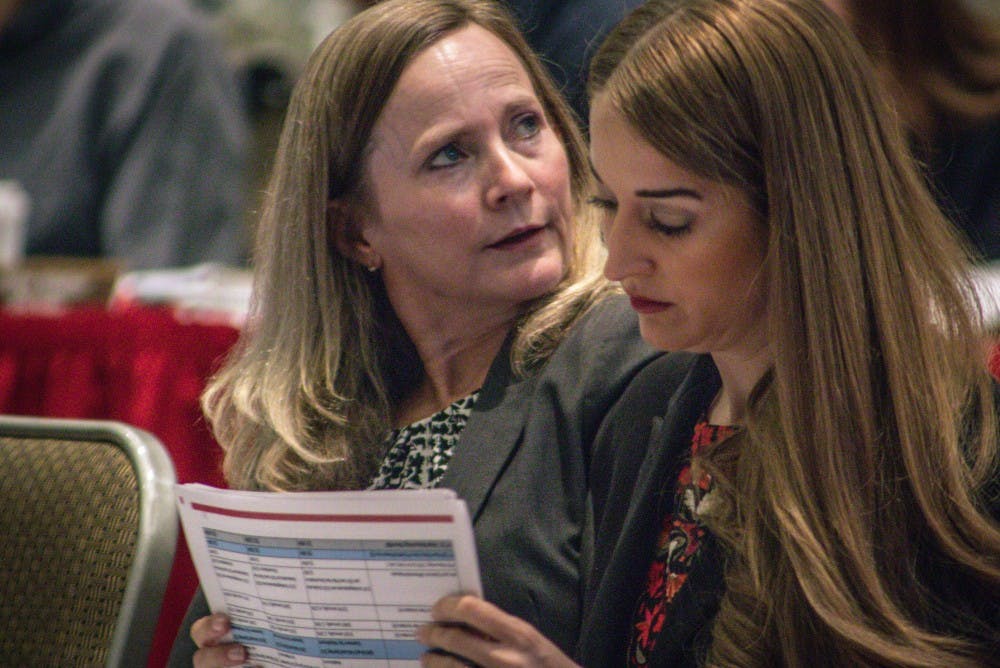It’s official — tuition is going up.
The University of New Mexico Board of Regents debated, then voted 6-1 to adopt the Budget Leadership Team’s proposal to raise base tuition by 3.1 percent. Regent Kimberly Sanchez Rael was the sole dissenter.
The increase will provide for a 3 percent employee compensation bump — lower than the state-mandated 4 percent. The additional 1 percent will be potentially covered by a supplemental appropriation to the state: a request of an additional $4.6 million dollars.
Regent Robert Schwartz, who put forward the motion, said the increase in tuition would send a clear message to the State Legislature when UNM requests additional funds.
“It would say the quality of the faculty and staff at UNM is so important to the students that they are willing to pay a little more for it… and we don’t want to burden them any more,” Schwartz said.
The increases stem from higher costs in student fees, base tuition, technology fees, upper division premiums and the College of Arts and Sciences (A&S) differential tuition.
Reported numbers for what students will pay per semester:
- Undergraduates taking 15 credit hours of lower division classes will pay $3,827.84, an increase of 166.64.
- Undergraduates taking 15 credit hours of upper division classes will pay $4,352.84, an increase of 316.64
- Graduate students taking 12 credit hours will pay $4,773.77, an increase of $302.09
The numbers above do not reflect differential tuition increases, refer to Justin Garcia’s story for more information.
When asked by Sanchez Rael how students would know what they are paying on their bursar's’ bill, Interim Provost Richard Wood said mandatory student fees would decrease while total fee amounts for students would increase.
However, the recommendations show all the 3.43 percent in mandatory student fees.
Get content from The Daily Lobo delivered to your inbox
The BLT was responsible for developing the fiscal year 2020 projections and recommendations for managing the multi-million dollar budget. They provided an updated proposal after postponing the budget following a letter from the New Mexico Higher Education Department made clear that state higher education was to pay for 4 percent increases to employees’ salaries. The BLT only recommended a 2 percent increase for faculty and staff in their original budget.
The proposal presented Monday was not adopted without debate.
A prior motion to adopt a plan with no tuition increase failed in a 3-4 vote. That plan was not endorsed by the BLT, but put forward by Regent President Doug Brown with support from Regents Sanchez Rael and Sandra Begay.
Brown called it the “Two-two plan,” meaning the plan was to increase staff compensation by 2 percent in July (when the law mandates) and push the legislature to increase funding to provide for another 2 percent increase in January of 2020.
All the regent advisors — who have a spot on the BLT — spoke in support of the 3.1 percent tuition increase.
Pamela Pyle, Faculty Senate president, said she supported the tuition increase because the reserves are not an option.
“I don’t want to hurt the University by asking for more than we can bear at the moment. But this is exactly the spirit we need to be moving forward to not lose more colleges,” she said. “People are leaving, and you will have an inferior institution, to which no one will go.”
The University said it had limited options to provide the increase.
The Daily Lobo previously reported on the likelihood of tuition increases and asking for an additional appropriation from the Legislature.
The BLT is recommended a one-time use of central reserves, the University’s annual savings.
The move was approved by the Board of Regents and described in policy as “done only when necessary for the fiscal health of the University,” according to the University Administrative Policy 7000.
The use of reserves will increase from $500,000 to $3.5 million — or 600 percent.
Both University President Garnett Stokes and Wood warned the Regents that continued use of University reserves has long-term consequences for the University's ability to borrow money.
“We’ve been digging into those reserves over and over again and this is one time funding — once it’s spent, it’s gone,” Stokes said.
The Daily Lobo asked Sanchez Rael about her dissenting vote and what other alternatives she suggests in place of tuition increases.
“The main thing is fixing the enrollment issue,” Sanchez Rael said. “We need more data on the reasons for the drop in enrollment.”
Justin Garcia contributed to the reporting of this article.
Danielle Prokop is a senior reporter for the Daily Lobo. She can be reached at news@dailylobo.com or on Twitter @ProkopDani.






